#recently i've realized that i'm on year 8 of being mentally ill
Explore tagged Tumblr posts
Text
listened to a song i loved in high school when i was in a bad place for the first time in years and started crying. it really does get better. it did get better.
#recently i've realized that i'm on year 8 of being mentally ill#and struggling with the idea that maybe it'll always be like this for the rest of my life. just a constant state of unwell.#but i'm in a much better place than i was even a year ago and things are worlds apart from back when i loved this song#and also progress isn't linear so when i think abt my relapses into those lowest moments it seems like nothing's changed#but when you look at where i'm at when i'm doing well and even the fact that i'm doing well more often you realize it got so much better#and now i can listen to this song and feel pride and hopeful comfort rather than sad and doomed comfort#tea talks#the song was northern downpour by p!atd if anyone's wondering absjskls
20 notes
·
View notes
Text
Now, why would you dare me to embarrass you and your pals like that?
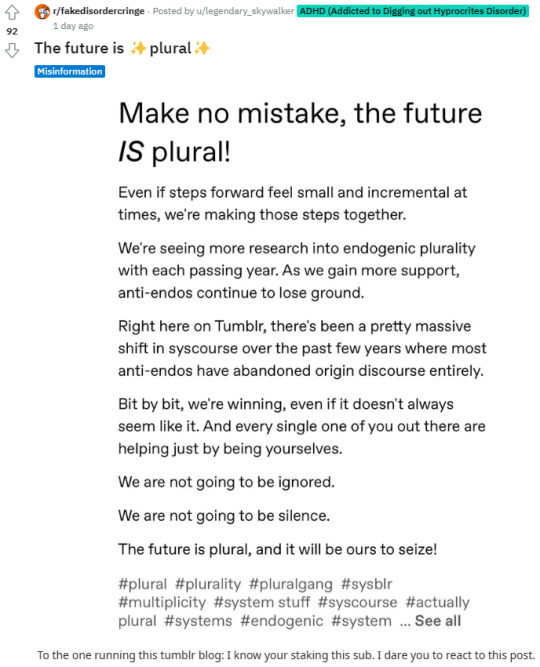
I appreciate how you wanted my attention so bad you posted me to not one, but two subreddits.

Makes a girl feel special! 🤣
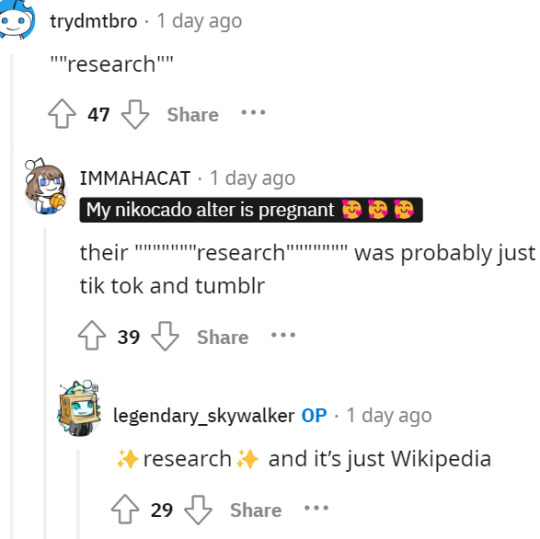
I have actually never seen Wikipedia cited as a source about endogenic plurality. Though I do see anti-endos all the time, when asked for sources, telling people to just Google things.
Anyway, here's @guardianssystem's document filled with academic papers about endogenic plurality:
I've compiled my own, but honestly, theirs is better organized than mine.
And in the interest of fairness, here are all the anti-endo papers debunking endogenic plurality:

Sorry, I forgot. Those don't exist. Oops. 🤷♀️
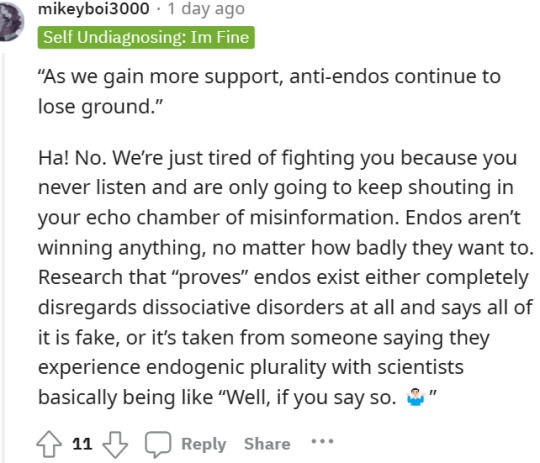
Echo chamber? LOL!
Weren't you the one spouting a bunch of lies on Tumblr, got totally debunked, posted the people who debunked you to r/systemscringe to have a hugbox where fakeclaimers could assure you how the people who contradicted you are all fakers, and then blocked everyone who disagreed with you?
Weren't you also the one who, when shown a quote from an expert in dissociative disorders who worked on the DSM-5 saying that a disorder isn't a disorder if it doesn't cause distress, argued that the people who defined what disorder are must be wrong about that definition?
You're a misinformation machine who can only find support when huddled in cringe subreddits. Don't try to talk about people in echo chambers.
Also, you know most of psychology is just... listening to people? That's how it's been as long as the field existed. DID (or MPD at the time) was a recognized disorder since long before the first brain scans were conducted on DID patients. It's saying something though when basically every single scientist who has ever researched endogenic plurality has said they believe it's a real thing, or that it could be. While absolutely zero academic papers have expressed that it's fake.
There is also an fMRI study into tulpa systems that's been in the works, but results have yet to be published.
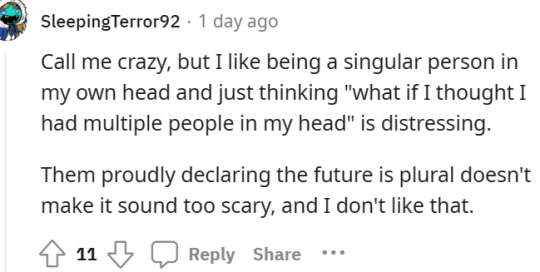
Sure, if that's what you'd like me to call you, Crazy. 😊
Anyway, Crazy, you should know that just because you personally find something scary doesn't mean everyone will or that the thing is bad. Personal preferences are a thing.
In a study of tulpamancers though, most generally reported their lives becoming better after the practice.
78% reported improvements in their mental health, and 91% on overall life.
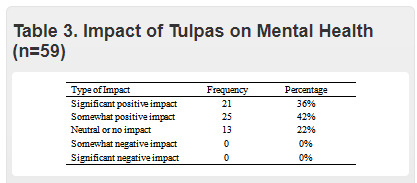
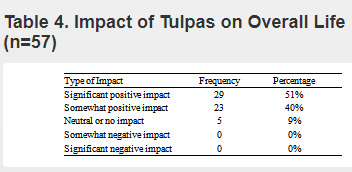
There are many out there who would jump at the chance to have someone there with them that knows them intimately, and to never have to be alone again.
If it's not for you, then so be it.
But it's certainly not something to be afraid of.
And maybe, for those who are willing to commit to the practice while America struggles with an epidemic of loneliness, it's something worth being open to.

This is actually pretty fair.
But that's now, and I'm looking at course of history and trends of plural acceptance.
300 years ago, any plural would be viewed as demon possessed and end up tortured or killed for their plurality.
70 years ago, all plurality was seen as a mental illness, and it was common to force plurals, as well as anyone else associated with mental illnesses, into asylums.
30 years ago, the first real plural communities were able to connect on the internet and form in small numbers.
8 years ago, the first studies into endogenic plurality started being conducted. 4 years ago, the ICD-11 acknowledged that you could have multiple distinct personality states without a disorder. 2023 marked the first, but certainly not the last, time a system used their system name as an author of an academic paper.
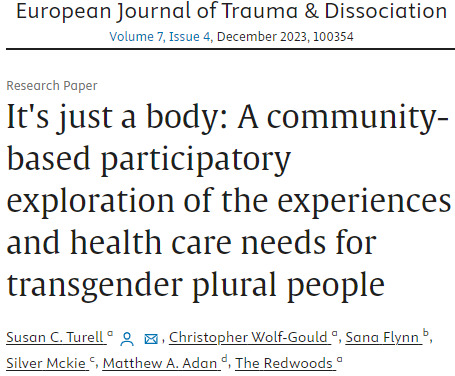
Recently, new plural resources have been designed and put into use. More servers than ever are using Pluralkit. And Simply Plural went from 100k users at the end of 2021 to 210k at the end of 2022.


Progress is happening far more rapidly than you realize. And you had best be ready for it.

BOO! 👻
Oh, hey, I just realized... this is literal pluralphobia!
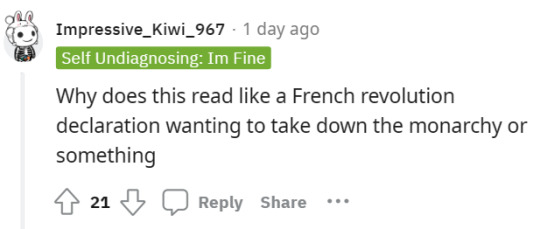
Liberté!
Egalité!
Fraternité!
And yes, The Future is Plural! 😜
#syscourse#plural#plurality#pro endo#pro endogenic#endogenic#systems#multiplicity#plural system#endogenic system#system stuff#plural community#systemscringe#fake disorder cringe#r/systemscringe#sysblr#system things#actually plural#actually a system#the future is plural#I dare you to post this to your hate subs! 😝
132 notes
·
View notes
Text
Trust Fall
Having come from a bad home, I have severe trust issues. But mine go deeper than "why was I hurt?" I also ask, "the people that hurt me, why were they hurt first?"
I often say that I was abused every way except sexually. The people who hurt me were also abused when they were growing up, and even as adults. Heck, they abused each other. And I've often asked God why, because if they hadn't been hurt, they wouldn't have hurt me.
This line of thinking led to me to a point where I felt I couldn't trust God. Even though I knew Jesus, I didn't trust Him. Recently, I suffered a severe panic attack. Looking back, I see now that it wasn't my first, but the others were so much smaller and came in such a different form that I thought it was just my terrible temper getting the better of me again. With this one, I spent hours lying in bed, screaming and crying, feeling like my entire body was going to break and crumble into dust. I know it wasn't psychological; it was spiritual. I was filled with demons, and they were injecting every cell in my body with their poison.
I'm not going to go into the subject of whether mental illness is psychological or spiritual, at least not today. What I am saying is that I know, without a doubt, that what I experienced was spiritual. I wasn't sick; I was possessed. Yes, Christians can become possessed. And it starts with not trusting our Saviour and our Father.
I got no sleep that night. I woke up about every hour or so. It was probably around one in the morning before I was able to fall asleep for the first time (for reference, this was on a weeknight, and I have to get up at 6 to be at work by 7). At the worst point, when every blood vessel in my body was burning and I felt like I would break, when my mind was not my own, I found myself crying out, "Father, I don't trust you, but I love you, anyway. You've been good to me. You didn't make anyone hurt me, they listened to Satan; you were protecting me. And you got me away from all that and you've given me good things since then."
And then I was able to fall asleep for the first time. Every hour when I woke up because of the burning, breaking feeling in my body, I had this verse come to mind:
Thou wilt keep him in perfect peace, whose mind is stayed on thee: because he trusteth in thee. Isaiah 26:3
I would repeat this verse over and over, and ask God for peace, and after a few minutes, I would fall back asleep. I don't remember dreaming at all that night.
The next day, it occurred to me: all my life, I've thought that I was a horrible person and that I didn't love God. I knew God loved me, but because I didn't trust Him, I thought I hated Him. I even told Him so. Even after I accepted Jesus, I would scream at Him, "I hate you! Get out of my mind, get out of my heart, and leave me alone!" It was Satan talking, but I believed it was me.
That panic attack was the worst night of my life, even worse than any of the abuse I ever suffered. It was Satan saying, "I couldn't destroy you with your family, so I am going to rip you to shreds from the inside out!" And that's exactly what it feels like, like massive claws are ripping and tearing away inside me, shredding my insides.
But in the middle of this, when I thought it was all over, I was insane, and Satan had taken me over completely and I was done, I was gone, I was lost forever... the real me came out. The real me said, "no, I love God, and He is good."
And as I thought about this the next day, I finally got my answer as to why the people who hurt me never experienced God's goodness:
And we know that all things work together for good to them that love God, to them who are the called according to his purpose. Romans 8:28
This has always been one of my favorite verses, but it wasn't until after the panic attack that I realized what it means. Things only work for our good if we LOVE God. I've spent the last few years since I left home saying, "God, why are you being so good to me? Why were you never this good to my parents?" I tried rejecting His goodness and the things He was giving me, because I thought other people deserved them more than I did. This made my trust issues with God even worse- I thought it was a trick, a trap, that He was giving me good things just to rip them all away from me while He laughed.
But I realize now that He's been good to me because, many years ago, I chose to love God and to serve Him. Even before I accepted Jesus, I knew enough about the Bible that I wanted to serve God. I, myself, have never actually done anything to deserve God's favour, but He gives it to me because I love Him.
But my parents are both narcissistic. They only love and serve themselves. I don't say this to hate my parents. In fact, I always hate talking about the bad things that happened to me growing up, because I actually love and respect both of my parents, and I don't want to make everyone around me feel sorry for me and take my side against them or anything like that. But I simply cannot give any kind of testimony without explaining, this was my life.
As for trust, I'm thinking it has to be a conscious effort on my part. I have to choose, daily, to trust God and obey Him. I have a problem with overthinking everything. For instance, I live alone, but I eat a lot. I just have a big appetite, always did. But even I can't eat enough to prevent some of my food from spoiling. So I tend to eat out a lot instead of making food that will just go bad before I eat it all. But then the car breaks down (it's an old car and whoever owned it last apparently did NOT change any of her parts from the day she rolled out of the factory) and I feel severely guilty about all the money I spent on eating out.
But it boils down to trust. It boils down to, "I HAVE to do what God tells me every second of every day, or my life will go to pieces." And people keep telling me He doesn't work like that, but sometimes I have trouble believing it.
So, I have to make a constant, conscious effort to trust Him. Instead of agonizing over simple decisions like "do I boil a pack of hot dogs or go to McDonald's?" I just need to do stuff, stuff that I enjoy, and let God handle the rest. I'm calling this a "trust fall." When we do the wrong things, it's like stumbling and falling; but God says many times that He will catch us if we fall. So if, for instance, there's a cute shirt that I've been staring at on Rosegal for 3 months and it's on sale and I really want it, maybe go ahead and get it and stop worrying about whether or not I should have saved that money instead. I'm not saying "just do whatever I want and expect that God will let me and nothing bad will happen." I'm saying to stop agonizing over whether every little thing is something that's going to make God mad. Start telling myself, He doesn't work that way. He doesn't get mad like that, He doesn't punish us for... for just living and enjoying life. He promised freedom and abundant life (John 10:10).
Bad things will happen, but I need to remember, it's not God's punishment. Satan just wants to keep me in a place where I can't trust God so that he can drag me back down and shred my mind again. In those moments, my job is to hold onto God even tighter. And between those moments, my job is to draw closer to God so I can recognize Satan's attacks when they come.
#testimony#mental health#spiritual health#Bible discussion#trust#love#God's love#satan#isaiah 26:3#romans 8:28#Bible reference
2 notes
·
View notes
Text

…”…Important Lessons Learned from Gabby and Brian
As an author and advocate for survivors of domestic violence, I’ve learned a lot about the predictable patterns of unhealthy relationships. After years of personal experiences, research, and outreach, I’ve learned to recognize the tell-tale signs of abuse. I am not a licensed therapist, social worker, police officer, or minister. So please understand I shared my thoughts as 3 a.m. musings. When a few people asked me to make the post public, I agreed, reluctantly. I had no idea this message would resonate with so many people. I've worked back through the original post to explain a bit better how I'm feeling. I realize not everyone will agree with me, and I respect all opinions and views. All I ask is that we engage in respectful discourse on all sides. Thank you all.
In recent days, the tragic events involving Gabby Petito and Brian Laundrie have given us a lot to learn. This case is still under investigation, and I can only make assumptions based on the textbook patterns of abuse I’ve witnessed too many times to count. I also recognize that multiple families are grieving, and I have tremendous empathy for everyone involved. However, many survivors will resonate with at least some of the following insights, and I’m hoping we can use this tragedy to shift the way we as a culture approach the complicated issue of domestic abuse.
Let���s examine 30 important lessons this couple teaches us:
1. Followers on social media saw a smiling, happy couple, full of love and wanderlust, setting out for a cross-country adventure while documenting all the joys of young life. In many cases, targets become very good at smiling through the pain.
2. When the public was shown body camera footage captured by Moab City Police officer Daniel Robbins, (who pulled Laundrie and Petito over after the 911 call on August 12), some viewers assumed Petito was suffering from mental illness and Laundrie, while nervous, was the steadier of the two.
3. Other viewers assumed both partners were equally at fault—the old “it takes two” myth that doesn’t really apply to most abusive situations.
4. Some people even assumed Petito was the abuser and Laundrie was the victim.
5. These three assumptions probably crossed everyone’s mind as a possibility (they did mine). Healthy minded people tend to give others the benefit of the doubt, especially when someone is being accused of a negative act. Also, we can all understand that mental illness is a difficult situation and can tax even the kindest most gentle of souls (and the people who love them). Unfortunately, in many cases, this thought pattern leads us to assume the victim is mentally ill or that the victim is to blame for an altercation.
6. “Victim blaming” can happen even in the worst cases of abuse because we don’t see the longitudinal story unfolding. What we don’t see is that the target has managed to keep things together until she reached her threshold, at which time we may see her crying, yelling, or breaking down emotionally. By exhibiting those behaviors, many might assume the target is “crazy,” and it’s natural for us to feel as if the more stable person is more trustworthy.
7. If we listen carefully to Laundrie’s conversation with the officers, he even laughs and says, “She’s crazy.” (17.09) Then he dismisses it as a joke. Of course, he’s already put this claim in the officers’ minds (and by the nonchalant way he says it, many might assume it’s not the first time he’s said these words.)
8. So while viewers (and officers) start wondering if perhaps the target is “crazy,” the abuser plays the part of the poor, patient partner who has to deal with this irrational person. In the video, Laundrie mentions Petito’s anxiety and her OCD, painting her as an unstable partner. (Please note: I’m not at all justifying any physical violence against either party. No one should intentionally harm any other person. Period.)
9. A typical abuser would be skilled at convincing people that he’s innocent, while in fact he’s been acting very differently behind closed doors, pushing his target to this point intentionally and feeding on her emotional break. Many abusers LOVE to see evidence that they’ve hurt their target. They LOVE to see their target in pain. For this reason, “breaking” the target is usually the goal from the start. In cases of abuse, it may take an abuser hours, weeks, months, or even years to break the target, but he won’t stop until he gets that reaction, and then he’ll point the finger and say, “See? She’s crazy. I’m just trying to keep her calm.” And then he’ll do it again. And again. And again.
10. As a result, some people will buy into that false narrative. Even the target can be brainwashed to doubt her own truth. Which may be one reason we see Petito making many excuses for Laundrie’s behavior and taking the blame for everything.
11. In contrast, we see Laundrie blaming Petito, insisting he never hit her and saying he was just trying to keep her calm. He’s charming. He comes across as the loving and loyal partner. He’s joking around with the officers and even gives one a fist bump in the end. All the while, his fiancée is at risk of being charged with domestic assault and possibly spending the night in jail.
12. Later, we’ll hear the 911 recording that (it seems) the responding officers were not fully informed of at the time: “I’d like to report a domestic dispute.” The 49 second audio recording continues as the caller says, “The gentleman was slapping the girl.” When the dispatcher asks him to confirm that the man was slapping the girl, the caller responds, “Yes, and then we stopped, they ran up and down the sidewalk, he proceeded to hit her, hopped in the car, and they drove off.”
13. But long before the 911 call was made public, many survivors could already see through the spin playing out on the video footage. They easily recognized the “red flags” because these cycles become the norm for victims of long-standing abuse. Many targets eventually become conditioned to believe everything the abuser does is her fault. Covering for the abuser, accepting all the blame, trying harder to make the abuser happy—this warped reality becomes the only truth a target knows.
14. Also, it seems clear that Petito doesn’t want her fiancé to be in any trouble. She’d rather pay the price and protect the man she loves. And because she probably believes he only acted this way because of her mood/behaviors/anxiety/OCD/job, she doesn’t want him to be blamed. This is also the norm in abusive relationships.
15. Many experienced and well-trained officers see right through this typical pattern. Others buy the cover-up story. And, sadly, because some officers are also abusers, some side with the abuser even when they know exactly what’s going on. Throughout the video, we get the sense that Officer Robbins senses there’s more to the story.
16. I credit the police in Petito’s situation, especially Officer Robbins. The four responding officers (two of whom were park rangers) remained calm, they separated the couple, they interviewed them individually, they split them up for the night, they consulted the domestic violence shelter … many would say they did everything right considering the information they had at the time.
17. I imagine the officers involved may be suffering from tremendous guilt and wondering if they could have prevented Petito’s death, but I want to give credit to the officers in this case. While it’s easy to look back and say maybe they should have handled things differently, knowing what we now know, I was impressed with how well they treated both Laundrie and Petito (and, sadly, I was thinking how rare it is to see that level of respect and professionalism in most cases of domestic violence, particularly in the South where I’ve been most involved with survivors’ stories.)
18. After Petito was reported missing, many people expressed shock in response to the Laundrie family’s refusal to cooperate early in the investigation. Petito reportedly lived with the Laundrie family for more than a year. Anyone can see that this family will do anything to protect their son, even at the cost of an innocent young woman who was a real part of their family and soon to be their daughter-in-law. While most of us can certainly understand parents wanting to protect their son, most would agree they crossed a moral line when his fiancée went missing.
19. But perhaps it goes deeper than that. Perhaps what we’re seeing is a system of enablers who not only allowed their son to abuse Petito (which may have been a factor in her reported anxiety) but also a system of gaslighters who may have always been shifting the truth to keep Petito confused and make her believe she was the problem.
20. It’s not a far stretch to assume Petito was caught in a system of abuse. And once a target is caught in that psychological web, it’s extremely difficult to see a way out. Reality becomes flipped.
21. It’s also worth noting that Petito and Laundrie had been involved in various levels of a relationship since their teens. This is also commonly observed in dysfunctional partnerships.
22. These immature relationships work beautifully when both partners grow together and mature emotionally. But when one wants to keep the other down, naïve, and under his control … and the other is growing, learning, and maturing … it doesn’t work.
23. We hear Petito tell the officer that Laundrie didn’t think she could succeed with her travel blog (3.25). It seems clear that he didn’t believe in her and that he was trying to make her doubt herself.
24. Throughout the conversation, he implies that he locked her out of the van because she wouldn’t calm down. But when we listen to the full video, it seems he was upset because they’d spent too much time at the coffee shop with her working on her website when he wanted to go hiking. This suggests that because she wasn’t in the van when he was ready to leave, he lost his temper.
25. In the moments that followed, the altercation became physical. Reportedly, Laundrie squeezed Petito’s face with his hand, cut her down verbally, and criticized her.
26. Some would argue that this escalating abuse typically persists until the target reacts emotionally and/or physically. If this case follows the norm, Laundrie may have been trying to break her spirit, intentionally.
27. Why? Again, if this case follows the typical situation, it would likely be because Petito’s focus wasn’t 100% on Laundrie. She had found this new job she enjoyed. She was succeeding at it, and it was allowing her to connect with other people. (Remember, she’d already left her job as a nutritionist to travel around the country with Laundrie.)
28. In a healthy relationship, the new job might be considered a positive opportunity for Petito. Especially considering Laundrie admits they have very little money (not even enough to afford a hotel room to prevent his fiancée from going to jail). But in an unhealthy relationship, the abuser wants the target all to himself. And when that doesn’t happen, he can become increasingly violent.
29. Petito now had this one little piece of her life that Laundrie couldn’t control, so if we’re looking at textbook patterns, perhaps her blog angered him. Perhaps he didn’t like all the attention she was getting on social media. Perhaps he punished her for it. And then a cycle developed. Even though she was doing nothing wrong by building a new career.
30. The next thing we know, we have a missing person, a recovered body, a young man on the run, and several families destroyed. Too much grief to measure. And the truth is, it will happen again tomorrow, and the next day, and the next day, until we learn to recognize and respond to abusive situations in healthier ways.
The overall takeaway?
When we see someone at her emotional end during a domestic dispute, we shouldn’t assume she’s crazy. We shouldn’t buy into the false narrative given by the abuser. We shouldn’t believe the cover-up story by the target who has been conditioned to carry all the blame and shame. And we shouldn’t assume they’re going to be okay.
Instead, we should all learn the difference between healthy and unhealthy relationships. We should learn to recognize the warning signs of abuse. We should engage in respectful, fact-based conversations about trauma bonds, abusive cycles, and emotional intelligence. We should be familiar with terms like gaslighting, hovering, love bombing, enabling, triangulating, and projecting. We should stop blaming targets and help them reclaim their truth. And we should stop repeating the age-old myths that keep targets trapped in these dangerous and all-too-often deadly cycles.
Finally, while I’ve used the most common scenario of male-on-female violence in this article, we should recognize that abuse crosses all barriers and can impact anyone regardless of gender, sexuality, ethnicity, nationality, religious affiliation, age, or socio-economic level. And we should stop assuming these situations will get better in time. Personally, I haven’t heard of one abusive relationship that became healthier. Not one. Not with therapy. Not with church. Not with prayer or forgiveness or complete surrender. When an abuser is determined to destroy his target, he will not stop until that target is erased from this world or stripped from her life. And in many cases, he’ll walk away without any consequences, often taking the target’s finances, home, vehicle, reputation, or even her children with him.
Please don’t let the next statistic be you or someone you love. For support, contact the Domestic Violence Hotline. From a safe phone, call 1-800-799-SAFE (7233) or text “START” to 88788…..”….
0 notes